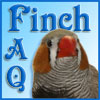Signs
of Illness
Fluffed
Feathers
There
are many indications that a bird may be ill. One of the most
common and easy to recognize symptoms is puffiness. A sick bird
will often sit with fluffed feathers to stay warm. When this
happens, they lose that sleek trim appearance. Sometimes a fluffed
bird will look ragged or fat. On occasion, perfectly healthy
birds fluff up for short periods. If you frequently see them
in this condition, however, there may be a problem. Be aware
that even a sick bird will tighten his feathers if he perceives
danger. So don't be surprised or fooled by a fluffed bird who
suddenly pulls in and tightens his feathers when you approach.
This is a defense mechanism so that he doesn't look as vulnerable
to prey.
Wet
Vent
Another symptom of a sick bird is a wet vent (the bird's
underside, where he/she excretes droppings from). This area
should be clean and dry in a healthy bird.
Respiratory
Symptoms
Heavy breathing is another telltale sign of illness. This
is frequently accompanied by tail-bobbing. Coughing, sneezing,
or nasal discharge is indicative of a problem.
If
you hold a bird to your ear and hear a clicking sound while
they breath, you should have him/her checked out immediately.
This is a frequent symptom of air sac mites (among other things).
Inactivity
Lethargy and sleepiness are behaviors to watch out for.
Obviously, all birds will nap periodically throughout the day.
But a bird who is commonly napping while the others are active
is most likely suffering from an illness. A social bird who
suddenly prefers to be alone may be suffering from an illness.
A bird sitting on the bottom of the cage or aviary most likely
has a problem. (Note that my pair of strawberries have always
enjoyed sitting together for periods on the bottom, even when
totally healthy. This is why it is important to know the personalities
and habits of your birds - so you can identify behaviors that
are abnormal for that particular bird. When the male strawberry
sat on the bottom alone and shunned the company of the female,
I knew there was a problem).
Lack
of Appetite
If a bird stops eating due to illness, this could be big
trouble. Note that sometimes a sick bird will give the appearance
of eating by sitting near the seed or sifting its beak through
the seed. Make sure to watch carefully and see if they are actually
hulling the seed and eating it.
Lack
of Vocalization or Song
A sick bird does not want to draw attention to himself for
fear that he may become victim to a predator. Sick birds also
want to conserve energy. For this reason, a sick bird who normally
sings or chirps may suddenly become quiet.
Unusual
Droppings
A good practice is to check the droppings every day, looking
for anything abnormal. This is very difficult for me, as I have
a number of birds in the aviary and the droppings vary based
on species, diet, and gender. However, there are certain basic
things to watch out for. For example, the urates (the opaque
fluid that accompanies the dropping) should always dry white.
It if dries yellow, green, or any other color, there could be
a problem. This linked article
gives a good general description of normal and abnormal droppings.
Because it is difficult to examine droppings when you use litter
or bedding on the cage/aviary floor, many people recommend the
use of paper instead. I make it a point to look at the droppings
every day (if for no other reason than to become accustomed
to what they should look like under healthy conditions).
Click
Previous to return to the Illness Introduction | Click Next
for suggestions for Dealing with Illness
PREVIOUS  |
|  NEXT
NEXT
 TOP
TOP


